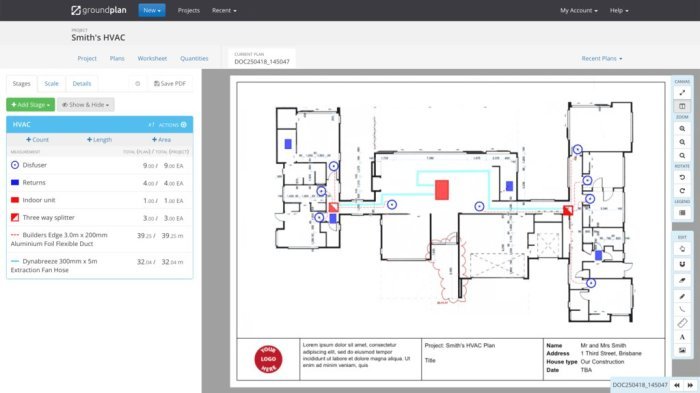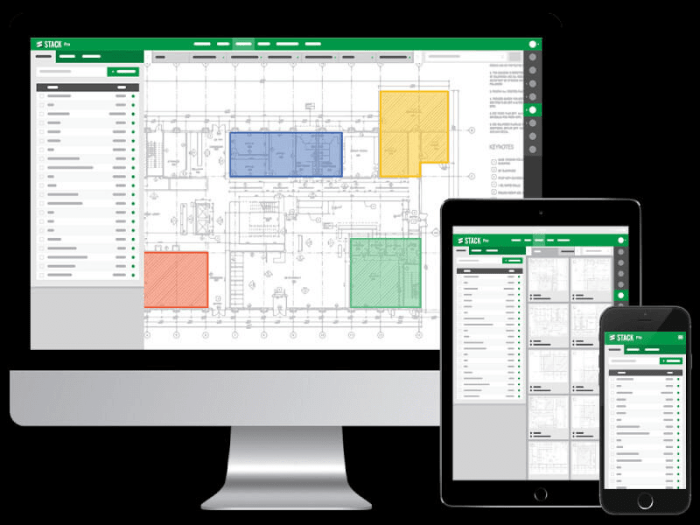In the dynamic realm of heating, ventilation, and air conditioning (HVAC) systems, accurate estimation and quoting play a pivotal role in ensuring project success and profitability. The advent of specialized HVAC software has transformed this process, offering contractors and engineers a powerful tool to streamline their operations and deliver exceptional results.
HVAC software specifically designed for estimating and quoting empowers professionals with a comprehensive suite of features tailored to their unique requirements. From seamless integration with design and engineering tools to customizable templates and robust reporting capabilities, these solutions enhance accuracy, efficiency, and informed decision-making.
HVAC Software Features for Estimating and Quoting

HVAC software designed specifically for estimating and quoting streamlines the process, providing accurate and efficient results. These software solutions incorporate features tailored to the unique requirements of HVAC contractors, enabling them to quickly and effectively create estimates and quotes that meet customer needs.
Core Features
HVAC estimating and quoting software typically offers a range of core features, including:
- Project Templates: Pre-built templates for common HVAC systems, allowing users to quickly create estimates and quotes based on standardized configurations.
- Equipment Database: Comprehensive databases of HVAC equipment, including specifications, pricing, and availability, ensuring accurate cost calculations.
- Labor Estimator: Automated calculation of labor costs based on industry-standard labor rates and project complexity.
- Material Takeoff: Automatic generation of material lists, ensuring accurate quantities and pricing.
- Proposal Generation: Professional-looking proposals that include detailed estimates, equipment specifications, and project timelines.
Benefits of Using Specialized HVAC Software
Utilizing specialized HVAC software for estimating and quoting offers several advantages:
- Accuracy: Comprehensive databases and automated calculations minimize errors, ensuring precise estimates and quotes.
- Efficiency: Streamlined workflows and pre-built templates save time and effort, allowing contractors to create estimates and quotes quickly.
- Consistency: Standardized templates and processes ensure consistency in pricing and project documentation.
- Professionalism: Professional-looking proposals enhance the contractor’s image and credibility.
Examples of HVAC Estimating and Quoting Software
Several software solutions are available that provide specialized features for HVAC estimating and quoting, including:
- HVAC-Calc
- QuickPen
- Elite Software
- Accubid
- MeasureSquare
Integration with HVAC Design and Engineering Tools
HVAC software can seamlessly integrate with design and engineering tools, streamlining the estimating and quoting process. This integration allows users to import designs directly into the software, eliminating the need for manual data entry and reducing the risk of errors.
Popular HVAC Design Tools with Seamless Integration
Several HVAC software solutions provide seamless integration with popular design tools, including:
- AutoCAD
- Revit
- SketchUp
- IES
- Carrier HAP
Customization and Flexibility for Different HVAC Systems
HVAC software offers customizable features that allow users to adapt it to the specific requirements of various HVAC systems and project needs. By selecting software that provides flexibility in configuring estimates and quotes, businesses can tailor their proposals to meet the unique design and specifications of each project.
Customizable software is crucial for addressing the diverse needs of different HVAC systems, ensuring accurate and tailored estimates and quotes.
System Compatibility and Configuration
HVAC software can be customized to accommodate different types of HVAC systems, including:
- Heating systems (e.g., furnaces, boilers)
- Cooling systems (e.g., air conditioners, heat pumps)
- Ventilation systems (e.g., fans, ducts)
- Combined systems (e.g., packaged units, rooftop units)
By configuring the software to match the specific system being estimated, users can ensure that all relevant factors and components are considered, leading to more accurate and reliable estimates.
Flexible Estimate and Quote Generation
Customization extends to the generation of estimates and quotes, allowing users to tailor the output to their specific requirements. This includes:
- Customizing the layout and format of estimates and quotes
- Adding or removing specific sections or items as needed
- Incorporating company branding and logos
- Integrating with accounting and project management software
By customizing the estimate and quote generation process, businesses can create professional and visually appealing documents that effectively communicate the project scope and pricing.
Reporting and Analytics for Informed Decision-Making
HVAC software for estimating and quoting provides comprehensive reporting and analytics capabilities to help businesses make informed decisions about pricing and project planning. These reports and analytics offer valuable insights into project costs, profitability, and resource allocation, enabling businesses to optimize their operations and maximize profits.
Key Features of Reporting and Analytics in HVAC Software
- Customizable Reports: Generate tailored reports that meet specific business needs, including project summaries, cost breakdowns, and profitability analyses.
- Interactive Dashboards: Visualize key performance indicators (KPIs) and track progress over time using interactive dashboards that provide real-time insights.
- Historical Data Analysis: Access historical data to identify trends, analyze performance, and make informed decisions about future projects.
- Benchmarking: Compare performance against industry benchmarks to identify areas for improvement and optimize pricing strategies.
- Integration with Accounting Systems: Seamlessly integrate with accounting systems to streamline financial reporting and gain a complete view of project profitability.
Cloud-Based Solutions for Remote Access and Collaboration
Cloud-based HVAC software for estimating and quoting offers several benefits, including remote access, real-time collaboration, and improved project management.
With cloud-based software, HVAC professionals can access their projects and data from anywhere with an internet connection. This allows for greater flexibility and convenience, enabling teams to work together seamlessly regardless of their location.
Examples of Cloud-Based Software
- Autodesk Revit: Revit is a popular cloud-based software that enables architects and engineers to collaborate on building designs. It includes features for HVAC design, estimation, and quoting.
- Trimble Nova: Nova is a cloud-based platform that provides HVAC contractors with tools for project management, estimation, and quoting. It offers real-time collaboration and data sharing capabilities.
- e-Builder: e-Builder is a cloud-based construction management software that includes features for HVAC estimating and quoting. It facilitates project planning, scheduling, and document management.
Advantages for Project Management and Team Communication
Cloud-based HVAC software provides several advantages for project management and team communication, including:
- Centralized Data Management: Cloud-based software stores all project data in a central location, ensuring that everyone has access to the most up-to-date information.
- Real-Time Collaboration: Cloud-based software allows team members to collaborate on projects in real-time, reducing delays and improving communication.
- Improved Communication: Cloud-based software often includes built-in communication tools, such as instant messaging and video conferencing, which facilitate effective team communication.
Industry Trends and Best Practices for HVAC Estimating and Quoting

The HVAC industry is constantly evolving, and so are the best practices for estimating and quoting. By staying up-to-date on the latest trends and technologies, you can improve the accuracy, efficiency, and profitability of your HVAC business.
One of the most important trends in HVAC estimating and quoting is the increasing use of software. Software can help you to automate many of the tasks involved in the estimating and quoting process, such as calculating material costs, labor costs, and overhead costs.
This can save you a significant amount of time and effort, and it can also help you to improve the accuracy of your estimates.
Optimizing Software Use
To get the most out of your HVAC estimating and quoting software, it is important to use it correctly. Here are a few tips:
- Make sure that you have a good understanding of the software’s features and functionality.
- Use the software consistently to ensure that your estimates are accurate and consistent.
- Keep your software up-to-date with the latest features and updates.
Emerging Technologies and Innovations
There are a number of emerging technologies and innovations that are changing the way that HVAC estimating and quoting is done. These technologies include:
- Cloud-based software
- Artificial intelligence (AI)
- Machine learning (ML)
These technologies can help you to improve the accuracy, efficiency, and profitability of your HVAC business.
Closure
As the HVAC industry continues to evolve, so too does the software landscape. By embracing the latest advancements in cloud-based solutions, remote collaboration, and data analytics, businesses can stay ahead of the curve and deliver unparalleled customer experiences. Investing in robust HVAC software for estimating and quoting is an investment in the future of your organization, ensuring precision, efficiency, and profitability in every project you undertake.
Q&A
What are the core features of HVAC software for estimating and quoting?
HVAC software typically includes features such as automated calculations, customizable templates, equipment databases, integration with design tools, reporting and analytics, and cloud-based access.
How does HVAC software integrate with design and engineering tools?
Many HVAC software solutions offer seamless integration with popular design and engineering tools, enabling users to import project data directly into their estimates and quotes, ensuring accuracy and consistency.
Why is it important to customize HVAC software for different systems and project requirements?
Customization allows contractors to tailor the software to their specific workflow and project needs, ensuring that estimates and quotes accurately reflect the unique requirements of each job.
How can reporting and analytics capabilities in HVAC software aid decision-making?
Reporting and analytics provide valuable insights into project profitability, equipment performance, and customer preferences, enabling businesses to make informed decisions about pricing, resource allocation, and future investments.
What are the advantages of cloud-based HVAC software for estimating and quoting?
Cloud-based software offers remote access, real-time collaboration, automatic updates, and enhanced data security, allowing teams to work efficiently from anywhere, at any time.